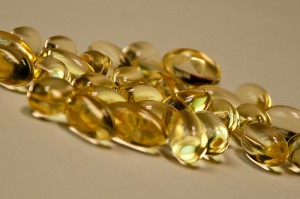Rickets and scurvy aren’t the only types of vitamin deficiencies; many vitamin deficiencies such as vitamin B12 deficiency (eg: pernicious anemia) and vitamin D deficiency cause debilitating symptoms like nerve damage, depression, heart disease, and memory loss. In some cases, you can develop a vitamin deficiency even while eating a healthy diet of lean meats, vegetables, and low-fat dairy foods.
Vitamin A (Retinol) deficiency
Vitamin A is a fat-soluble nutrient that can be found in animal-based products and plant-based foods like Romaine lettuce, carrots, yams, cantaloupe, and peaches. Vitamin A is crucial for supporting eye health, sustaining cellular and tissue health, and promoting normal prenatal development.
In today’s age, vitamin A deficiency is rare. Unless you specifically avoid eating foods that contain vitamin A and beta-carotene, you will probably not get this vitamin deficiency.
Symptoms of vitamin A deficiency are:
- Dry eyes
- Skin rashes
- Night blindness
- Diarrhea
People at risk for vitamin A deficiency are:
- Alcoholics
- People who are not able to digest fat due to an illness; individuals with celiac disease, cystic fibrosis, or cholestasis should have their vitamin A levels checked routinely.
Vitamin B1 (Thiamine) deficiency
Thiamine is a B vitamin that is essential for good stamina, enhancing muscle tone, and sustaining a healthy nervous system. Thiamine deficiency correlates with Beriberi disease, a rare illness that causes gastrointestinal disorders, peripheral neuropathy, heart disease, and muscular pain.
Symptoms of vitamin B1 deficiency are:
- Fatigue
- Depression
- Stomach cramps
- Difficulty digesting carbohydrates
People at risk for vitamin B1 deficiency are:
- People from countries who eat polished white rice that has been stripped of nutritious rice bran as a staple food item
- Pregnant or lactating mothers
- People with chronic diarrhea
- People with liver disease
- Alcoholics
9 Conditions that Mimic Fibromyalgia and Vitamin B12 Deficiency
Vitamin B2 (Riboflavin) deficiency
Vitamin B2 deficiency is almost unheard of in of itself. Usually, is somebody has vitamin B1 deficiency, they are also suffering from various other nutritional deficiencies at the same time, such as vitamin D deficiency and vitamin B12 deficiency.
Symptoms of vitamin B2 deficiency are:
- Fatigue
- Stomach problems
- Painful cracks and sores at the corners of your mouth
- Tired eyes
- Swollen tongue
- Sore throat
- Hypersensitivity to light
People at risk for vitamin B2 deficiency are:
- People from poorer populations or underdeveloped countries who do not have access to nutritionally dense foods
- Alcoholics
- People with chronic diarrhea, such as Crohn’s disease
Vitamin B6 (Pyridoxine) deficiency
Vitamin B6 is one of many essential B vitamins; vitamin B6 aids in cognitive development and maintaining the nervous system. Vitamins B6, B12, and B9 work together to maintain already healthy homocysteine levels for cardiovascular health.
Symptoms of vitamin B6 deficiency are
- Muscular feebleness
- Memory loss
- Depression
- Difficulty concentrating
Vitamin B6 is rare, but the following individuals are sometimes at risk:
- The elderly
- Pregnant women
- Women taking oral birth control
Vitamin B9 (Folic acid) deficiency
Folic acid, or folate, is a B vitamin that is crucial for production of DNA and RNA during fetal development, infancy, and adolescence. Folic acid also works together with vitamin B12 to produce red blood cells and assist in iron absorption.
Symptoms of vitamin B9 deficiency are:
- Fatigue
- Sore tongue
- Gum disease
- Shortness of breath
- Diarrhea
- Short-term memory loss
- Reduced appetite
People at risk for vitamin B9 deficiency are:
- Alcoholics
- Pregnant women
- People with inflammatory bowel disease (IBD)
- People with celiac disease
Vitamin B12 (Cobalamin) deficiency
Vitamin B12 is a water-soluble B vitamin that occurs in animal-based foods like beef, chicken, fish, shellfish, eggs, cheese, and milk. Vitamin B12 is essential for energy, healthy DNA, red blood cell production, cognitive functioning, and a health nervous system. Vitamin B12 deficiency differs from other kinds of malnourishment in that it can occur even when nutritional guidelines for vitamin B12 consumption are being met.
Symptoms of vitamin B12 deficiency are:
- Fatigue
- Depression
- Anxiety
- Short-term memory loss
- Difficulty concentrating
- Painful tingling in the hands and feet
- Sore, red tongue
- Frequent clumsiness and stumbling
People at risk for vitamin B12 deficiency are:
- Individuals who eat a vegan diet
- Diabetics taking metformin
- GERD sufferers or pregnant women taking protein pump inhibitors (PPIs)
- People with pernicious anemia who lack intrinsic factor
- People who suffer from gastrointestinal symptoms, such as Crohn’s disease, colitis, migraines, fibromyalgia, gluten intolerance, or celiac disease
- People who have had gastric bypass surgery
- Any individuals who have had surgery involving the removal of the ileum
- The elderly
- Alcoholics
Vitamin C (Ascorbic acid) deficiency
Vitamin C is a water-soluble vitamin found in tomatoes, citrus fruits, broccoli, and potatoes. Vitamin C is helpful in growing cell tissue to seal wounds, promoting a defense against free radicals, and for maintaining healthy bones and teeth. Long ago, vitamin C deficiency caused scurvy, which caused swollen bleeding gums, fatigue, and lowered immune system.
Symptoms of vitamin C deficiency are:
- Dry hair
- Gingivitis
- Dry, flaking skin
- Slow healing from wounds and bruises
- Nosebleeds
- Proneness to infections
People who are at risk for vitamin C deficiency are:
- Cigarette smokers
Vitamin D deficiency
Vitamin D is a fat-soluble nutrient that is stored in your body and produced with exposure to sunlight. Vitamin D is essential for aiding calcium in bone production and boosting your immune system. Rickets is caused by vitamin D deficiency in children. Other illnesses linked with vitamin D deficiency are osteoporosis, obesity, hypertension, seasonal affective disorder (SAD), diabetes, multiple sclerosis, and heart disease.
Symptoms of long-term vitamin D deficiency are:
People at risk for vitamin D deficiency are:
- People who live in cold, rainy northern countries with little exposure to sunlight
- People of dark skin color
- Infants
- People who cover their bodies completely with dark garments, even while outdoors
- The elderly
Vitamin E deficiency
Vitamin E is a fatty antioxidant that occurs in many foods and oils. Vitamin E is essential for promoting cardiovascular health, cellular functioning, and red blood cell production.
Symptoms of vitamin E deficiency are:
- Muscular feebleness
- Irregular eye movements
- Visual impairment
- Frequent stumbling
People at risk for vitamin E deficiency are:
- Individuals with cystic fibrosis, pancreatitis, and cholestasis who cannot digest fat molecules
Please tell us…
Have you been suffering from severe fatigue, memory loss, and general loss of energy?
Has this been building up for months, or years?
If so, you might have vitamin B12 deficiency.
Please share this article with your friends- spread the love!
Read more about vitamin B12 deficiency:
Balance your B12, Balance your Nerves
Vitamin B12 Deficiency and Movement Disorders- How They Relate
Lupus and Vitamin B12 Deficiency- What’s the Connection?
Sources:
Complementary and Alternative Medicine Index (CAM)
Images, from top:
gamene, LifeSupercharger, sushi♥ina, andi.vs.zf, Pink Sherbet Photography






